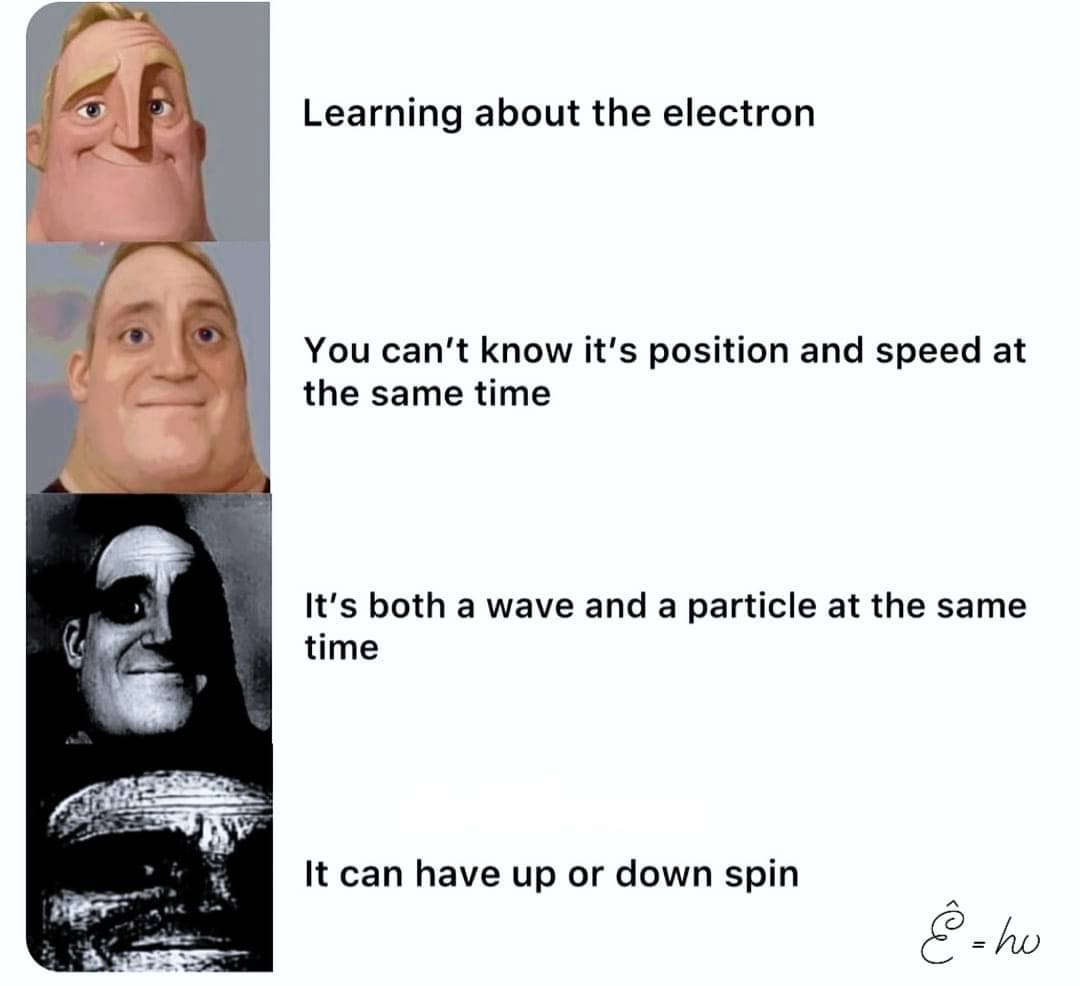this post was submitted on 27 May 2024
497 points (95.4% liked)
Science Memes
11161 readers
2437 users here now
Welcome to c/science_memes @ Mander.xyz!
A place for majestic STEMLORD peacocking, as well as memes about the realities of working in a lab.

Rules
- Don't throw mud. Behave like an intellectual and remember the human.
- Keep it rooted (on topic).
- No spam.
- Infographics welcome, get schooled.
This is a science community. We use the Dawkins definition of meme.
Research Committee
Other Mander Communities
Science and Research
Biology and Life Sciences
- !abiogenesis@mander.xyz
- !animal-behavior@mander.xyz
- !anthropology@mander.xyz
- !arachnology@mander.xyz
- !balconygardening@slrpnk.net
- !biodiversity@mander.xyz
- !biology@mander.xyz
- !biophysics@mander.xyz
- !botany@mander.xyz
- !ecology@mander.xyz
- !entomology@mander.xyz
- !fermentation@mander.xyz
- !herpetology@mander.xyz
- !houseplants@mander.xyz
- !medicine@mander.xyz
- !microscopy@mander.xyz
- !mycology@mander.xyz
- !nudibranchs@mander.xyz
- !nutrition@mander.xyz
- !palaeoecology@mander.xyz
- !palaeontology@mander.xyz
- !photosynthesis@mander.xyz
- !plantid@mander.xyz
- !plants@mander.xyz
- !reptiles and amphibians@mander.xyz
Physical Sciences
- !astronomy@mander.xyz
- !chemistry@mander.xyz
- !earthscience@mander.xyz
- !geography@mander.xyz
- !geospatial@mander.xyz
- !nuclear@mander.xyz
- !physics@mander.xyz
- !quantum-computing@mander.xyz
- !spectroscopy@mander.xyz
Humanities and Social Sciences
Practical and Applied Sciences
- !exercise-and sports-science@mander.xyz
- !gardening@mander.xyz
- !self sufficiency@mander.xyz
- !soilscience@slrpnk.net
- !terrariums@mander.xyz
- !timelapse@mander.xyz
Memes
Miscellaneous
founded 2 years ago
MODERATORS
you are viewing a single comment's thread
view the rest of the comments
view the rest of the comments

Actually a good point, tho. And also a good thought: If there is no special direction, what would be up? And that's where quantum mechanics gets even weirder: It's either up or down in the direction you measure.
It's either up or down whatever the direction.
If you measure 100%up-0%down then you rotate your frame of reference by 90°, you automatically get 50%up-50%down... (iirc)
It's weirdly teasing us like that!
Just in case it wasn't clear you can't measure anything other than "100%" up or down spin. The quantum state of it being 50/50 is described by 1/sqrt{2} times the up and down vector, when you measure it you have a probability of getting either result calculated by the square of the absolute (||psi||^2) that way you avoid getting a complex probability.
btw I was too scared to try in case it doesn't but can I use LaTeX in Lemmy comments? $\psi$ Edit: No LaTeX doesn't seem to work and btw I didn't study this so it might be taught differently at uni. This was explained to me in/for the context of quantum computing.
True! Thanks for the clarification, it's been a while since i played with the maths of quantum physics!
After you measure a spin as 100% up, the state will be close to that for a while, si the next measurement has higher chance of being up, with this probability slowly decreasing with time.
I think that assuming the particle has no (extra?) energy it's state does stay the same. That is of course not possible in real life though but the <20 millikelvin in some quantum computers get pretty close.
Also I think nobody says they measure it as 0/100% up, They just say up or down in my limited experience.
Does anyone have any good resources on quantum mechanics? (Most of my information comes from a few professors) There's some useful stuff on chem libretexts (I think that's what it's called) for simple wave functions, but it doesn't seem perfect.
I have old college textbooks in my library, Cohen-Tannoudji. I'm not sure about online resources though...
At least in the Stern-Gerlach experiment it's relative to the magnetic field.
Yeah, quantum mechanics lingo: measurement = interaction